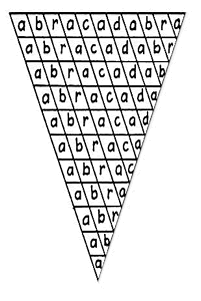An exclamation used by conjurers when performing tricks.
Abracadabra
What's the meaning of the word 'Abracadabra'?
What's the origin of the word 'Abracadabra'?
When stage conjurers and magicians come to the finale of a trick and exclaim ‘Abracadabra!’ the implication is that a mysterious power is being summoned to perform the required magic. In our information age, in which it is possible to look up how virtually any stunt is staged, we don’t take the claims of magical powers too seriously. That wasn’t the case when the word ‘abracadabra’ was first in common use.
Medieval people believed in magic as everyday fact and any unusual event that they couldn’t explain was considered to be the result of some form of enchantment. They used the incantation ‘Abracadabra’ to ward off such bewitchment and as a remedy for poor health.
The word was recited repeatedly, each time with the final letter being removed, until just ‘a’ remained. It was believed that the strength of the illness diminished as the word became shorter. The charm was also written out on paper and worn in an amulet or sewn into clothing.
No one is sure as to the origin of the strange word ‘abracadabra’. It is known to have been in use in 4th century Latin. There are no earlier uses of the word that are supported by any evidence. Nevertheless, there are several theories that place the derivation earlier, including:
– Roman sages, notably Serenus Sammonicus, coined the word and devised the repeated word formula in the 2nd century AD.
– It being related to another magical word – ‘abraxas’. In the Greek system of alphabetic numerology this word is significant in that it contains letters that add up to 365, the number of days in the year.
– The word is of Hebrew or Aramaic origin, being derived either from the Hebrew words ‘ab’ (father), ‘ben’ (son), and ‘ruach hakodesh’ (holy spirit), or from the Aramaic ‘avra kadavra’, meaning ‘it will be created in my words’.
Sadly, none of these theories stands up to close examination and actual documentary evidence is as insubstantial as those fragments of medieval paper.
A reference in print to the use of the word in English dating back to 1582 is found in Eva Rimmington Taylor’s The Troublesome Voyage of Capt. Edward Fenton:
Banester sayth yt he healed 200 in one yer of an ague by hanging abracadabra about their necks.
The belief in the power of the word lasted well into the 18th century. In his Journal of the Plague Year, 1722, Daniel Defoe was saddened by the continuing superstition of the populace when faced with the threat of plague:
People deceiv’d; and this was in wearing Charms, Philters, Exorcisms, Amulets, and I know not what Preparations, to fortify the Body with them against the Plague; as if the Plague was but a kind of a Possession of an evil Spirit; and that it was to be kept off with Crossings, Signs of the Zodiac, Papers tied up with so many Knots; and certain Words, or Figures written on them, as particularly the Word Abracadabra, form’d in Triangle, or Pyramid…
How the poor People found the Insufficiency of those things, and how many of them were afterwards carried away in the Dead-Carts.
Over time the belief in the power of ‘abracadabra’ receded and in the 19th century it came to mean ‘fake magic’. Terms like ‘legal abracadabra’ were used to denote the flummoxing of juries by fast-talking lawyers. Stage conjurers then adopted it into their inventory of the ‘magic’ words they used to punctuate their acts and the first known usage of it in that context dates from 1819.
Some of these words, like ‘hocus-pocus‘ (1634), ‘abraxas’ (1569) and ‘hey presto’ (1732), have a long history and a link to supernatural beliefs. Others, like hey-presto’s American form ‘presto changeo’ (1905) and ‘shazam’ (1940) are pure stage patter.
Younger readers may be familiar with the ‘killing curse’ from the Harry Potter books – ‘avada kedavra’, which Rowling adapted from the Aramaic. UK residents of a certain age will always prefer the ‘magic’ spiel of Sooty and Sweep’s mentor Harry Corbett – ‘Izzy, Wizzy, let’s get busy’.
The history of “Abracadabra” in printed materials
Trend of abracadabra in printed material over time
Related articles
Browse more Phrases
About the Author

Phrases & Meanings
A-Z
A B C D E F G H I J K L M N O P Q R S T UV W XYZ
Categories
American Animals Australian Bible Body Colour Conflict Death Devil Dogs Emotions Euphemism Family Fashion Food French Horses ‘Jack’ Luck Money Military Music Names Nature Nautical Numbers Politics Religion Shakespeare Stupidity Entertainment Weather Women Work
How did we do?
Have you spotted something that needs updated on this page? We review all feedback we receive to ensure that we provide the most accurate and up to date information on phrases.
